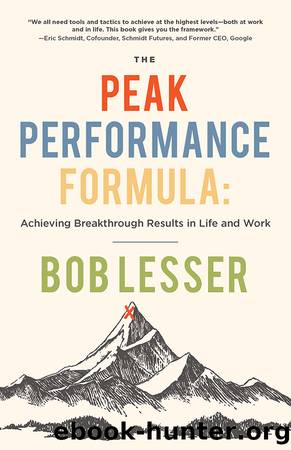The Peak Performance Formula by Bob Lesser;

Author:Bob Lesser; [Lesser, Bob]
Language: eng
Format: epub
ISBN: 9781951412258
Publisher: Independent Publishers Group
Failure Is Feedback
As an executive coach, I work with lots of start-up leaders. Many of them are constantly living on the cusp of feeling like failures. And for good reason. These founders are trying to create something that doesnât exist. Theyâre constantly months or even weeks away from running out of money, and they face a lot of skepticism from investors as well as pressure from competitors who may have more resources. Moreover, many founders are relatively young and mostly unproven (people of color and women founders experience even greater obstacles).
Given all this, the preoccupation with failure looms large for many entrepreneurs and in our culture in general. For many of us, this aversion is so strong that it stops us from taking the risk to pursue our idea or dream. But we have to get over this impulse in order to embrace a mindset in which we drive to continually better ourselves and achieve breakthrough performance. Today, many work cultures perpetuate an aversion to failure, even though they often state otherwise.
Companies that hold themselves as bastions of creativity and innovation have wrestled with this dilemma for decades. What it boils down to is this: how do we encourage risk taking and experimentation while still ensuring results?
Facebookâs motto, âmove fast and break thingsâ; the hyper popular increase in design thinking and its basic premise of prototyping; along with the concept advocated by various companies of âfailing forward,â are all attempts to get people to move past the failure stigma, so they may be their best creative selves.
But these tend to be mantras that carry with them the implicit caveat âas long as you succeed,â and they donât really address what people are most worried about: the stigma that failure has in our society. To fail is to be less than, to have lost it all. It is not just an action of failure, but an identification with being a failure.
We live in a goal-oriented society that values achievement over everything else. As kids, we may have been constantly told how special we were and how we were expected to do big things. We may have been praised by our parents, teachers, coaches, and peers when we performed well. But when we fell short, we werenât praised and sometimes were even ridiculed. As a result, we often measure ourselves by our achievements and not by our efforts or our passion. This emphasis on achievement leads us to avoid things we are not immediately good at, even if these pursuits can bring us real meaning and reward.
The achievement trap can be so far-reaching that a single experience of failure often makes us feel like we are failures as human beings. A setback, like missing the winning shot in the middle school basketball game, can be so stinging that we lose the confidence to take risks in other parts of our life, like trying out for a part in the school play. Although the outcomes of each situation are totally independent of each
Download
This site does not store any files on its server. We only index and link to content provided by other sites. Please contact the content providers to delete copyright contents if any and email us, we'll remove relevant links or contents immediately.
Tools of Titans by Timothy Ferriss(7737)
Change Your Questions, Change Your Life by Marilee Adams(7321)
Deep Work by Cal Newport(6490)
Man-made Catastrophes and Risk Information Concealment by Dmitry Chernov & Didier Sornette(5593)
Digital Minimalism by Cal Newport;(5325)
Playing to Win_ How Strategy Really Works by A.G. Lafley & Roger L. Martin(5311)
Big Magic: Creative Living Beyond Fear by Elizabeth Gilbert(5303)
The Slight Edge by Jeff Olson(5174)
The Motivation Myth by Jeff Haden(4965)
Ego Is the Enemy by Ryan Holiday(4890)
Stone's Rules by Roger Stone(4818)
The Laws of Human Nature by Robert Greene(4724)
Tuesdays with Morrie by Mitch Albom(4355)
Rising Strong by Brene Brown(4169)
Eat That Frog! by Brian Tracy(4101)
Skin in the Game by Nassim Nicholas Taleb(3941)
The Money Culture by Michael Lewis(3791)
Bullshit Jobs by David Graeber(3788)
Skin in the Game: Hidden Asymmetries in Daily Life by Nassim Nicholas Taleb(3695)
